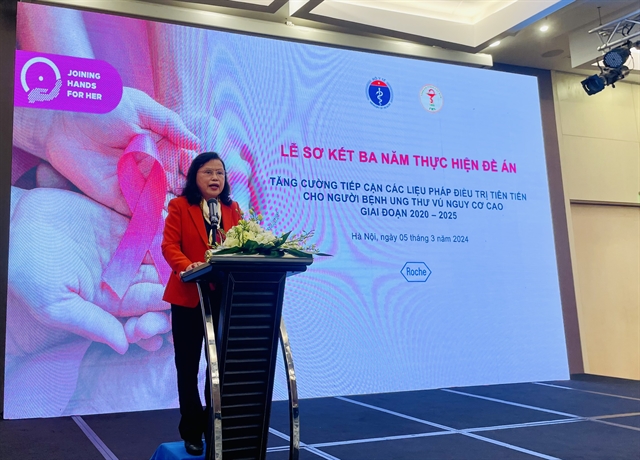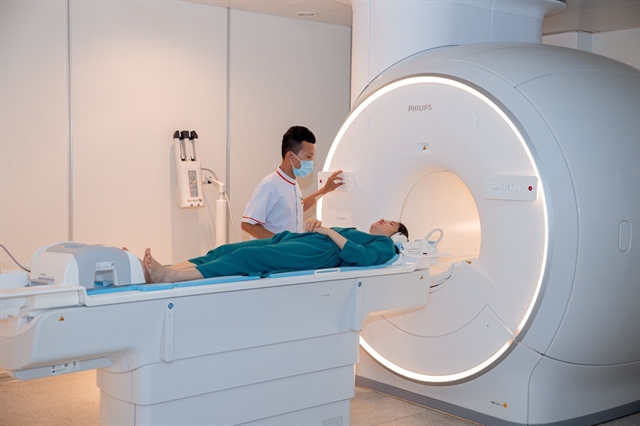 Society
Society

 |
| A woman is screened for breast cancer using an MRI (magnetic resonance imaging) machine at TWG Long An General Hospital. — VNA/VNS Photo Đức Hạnh |
HÀ NỘI — Early detection of breast cancer among Vietnamese women has increased to more than 75 per cent, according to recent statistics published by the National Cancer Hospital (K Hospital).
Previous studies show that in the past when awareness of breast cancer was limited, only 30 per cent of patients had their conditions diagnosed at an early stage.
According to Dr Nguyễn Trọng Khoa, deputy director of the Department of Medical Services Administration (under the Ministry of Health), breast cancer is one of the most common illnesses among women.
Global cancer data in 2020, released by the International Agency for Research on Cancer, revealed that each year Việt Nam has more than 21,500 new breast cancer patients and 9,345 people die from the disease.
Studies on breast cancer among Asian countries also show that the five-year survival rate is between 56.5 per cent to 86.7 per cent for early detection cases.
This figure is nearly 90 per cent in Việt Nam. For female patients below the age of 35, the ten-year survival rate is more than 80 per cent.
However, the age of breast cancer patients in Việt Nam tends to be younger, Khoa noted, while many people do not undergo regular health check-ups for early diagnosis, which makes treatment more difficult and costly.
The unavailability of newer medication and medical insurance coverage in Việt Nam also contributes to the problem, he added.
Various projects have been brought forward to address these issues, such as the one on increasing access to advanced treatment plans for high-risk breast cancer patients during the 2020-2025 period.
Deployed at the National Cancer Hospital, Bạch Mai Hospital, the oncology hospitals in Hà Nội and HCM City, Chợ Rẫy Hospital, the National Institute for Cancer Control (NCI), one of the project’s aims is to raise awareness on health screening for people at high risk of breast cancer.
President of Vietnam Medical Association (VMA) Nguyễn Thị Xuyên said that this is the first project dedicated solely to breast cancer in Việt Nam with a large number of partners, whose cooperation contributed to its success.
The project also improved diagnosis, treatment and administration for the illness by providing training in clinical practice and research for hundreds of medical workers, she added.
Meanwhile, 11 studies on health economics were conducted to increase advanced treatment access for patients with the fast-growing HER2-positive breast cancer.
These studies, which looked into payment policies for screening and treatment in different countries and evaluated the cost-effectiveness and financial impact of several types of medication for the illness, are the result of collaboration between the Vietnam Health Economics Association, Hanoi University of Pharmacy, Hanoi University of Public Health and the Health Strategy and Policy Institute.
Based on the research, the VMA and the Ngày mai tươi sáng (Bright Future) fund for cancer patients submitted to the health ministry a proposal on health insurance coverage for breast cancer screening among high-risk people, as well as several cancer drugs to ease the financial burden on the patients.
A support programme providing free medication for breast cancer patients is also deployed at 18 hospitals. As of December 2023, there have been 431 patients receiving free drugs worth more than VNĐ67 billion (US$2.7 million) in total.
An epidemiological map of cancers and cost assessment of cancer treatment plans from 2018 to 2020, as well as a study on the epidemiological characteristics and treatment costs for breast cancer in Việt Nam were published, alongside a criteria set for breast cancer diagnosis by the NCI.
Lê Văn Phúc, Head of Health Insurance Implementation at Vietnam Social Security gave high regard to the collaboration between the VMA, the NCI and others with the social security agency to conduct research and develop diagnosis criteria for cancer.
“The abundant and valuable data on cancers help authorities to have an overall view of this disease, thereby introducing appropriate policies for early detection, access to quality treatment and ease the financial burden on the patients, their families and the health insurance fund,” said Phúc. — VNS




